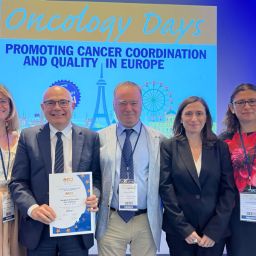
- Announced today, the PEGASUS study will assess circulating tumor DNA in blood to identify micrometastases in patients with colon cancer. These tiny drivers of disease relapse can evade detection by imaging.
- Identifying the presence or absence of micrometastases in individual patients will more precisely guide clinical decision-making and avoid unnecessary adjuvant treatment with chemotherapy.
Globally, more than 1.9 million new colorectal cancer (including anus) cases and 935,000 deaths were estimated to occur in 2020, representing about one in 10 cancer cases and deaths. Overall, colorectal ranks third in terms of incidence, but second in terms of mortality*. The need to improve outcomes for these patients is therefore paramount. The detection of occult micrometastases in individual patients following surgery will not only help to optimize treatment decision-making, but also avoid adjuvant chemotherapy for those patients without metastatic disease.
The PEGASUS Spanish-Italian collaborative study will assess circulating tumor DNA (ctDNA) in blood to do just that. Counting on the participation of three Spanish research centers – the Vall d’Hebron Institute of Oncology (VHIO – Vall d’Hebron Barcelona Hospital Campus), Hospital del Mar Medical Research Institute (IMIM), Barcelona, Instituto de Investigación Sanitaria (INCLIVA, Hospital Clínico Universitario de Valencia), this pioneering study is directed Silvia Marsoni, the FIRC Institute of Molecular Oncology (IFOM), Milan, Italy, and is supported by the AIRC Foundation’s 5 per mille program, and coordinated by Alberto Bardelli, the Candiolo Cancer Institute FPO-IRCCS – Candiolo, Turin, Italy.
For eight out of ten patients with colon cancer, surgery is the first treatment strategy. Following surgery however, some patients have micrometastases which go undetected by imaging; either performed before or after surgery. These micrometastases can grow and cause disease relapse within two to three years. For this reason, the majority of patients suffering from colon cancer undergo treatment with chemotherapy as a precaution.
“For more than half of these patients, adjuvant chemotherapy post-surgery is unnecessary. In this case, more is certainly not better. To avoid overtreating our patients, we need a diagnostic tool to accurately detect the presence of micrometastases; namely, liquid biopsy. The PEGASUS study is an excellent example of how research can improve outcomes for each individual patient,” commented Josep Tabernero, VHIO’s Director, Head of the Medical Oncology Department, Vall d’Hebron University Hospital (HUVH), and Principal Investigator of PEGASUS’ clinical research in Spain.
“Currently, we cannot precisely distinguish between those patients who need chemotherapy following surgery because of the risk of disease relapse, and those who do not because of cure by surgical intervention. Detecting tumor DNA in patients’ blood by liquid biopsy will inform us whether a patient is at an increased risk of cancer recurrence and thus require additional, more intensive therapy,” observed Clara Montagut, Head of the Gastrointestinal Cancer Unit, Medical Oncology Department at the Hospital del Mar Medical Research Institute (IMIM), and leader of clinical and translational research in novel therapies and biomarkers, who is Principal Investigator of translational research of the Alfa Omega project which is associated with the PEGASUS study.
Andrés Cervantes, who is lead clinical investigator of PEGASUS at INCLIVA, added, “This study represents an important step forward in avoiding unnecessary, additional treatments for those patients without micrometastases as well as reducing the risk of disease relapse in those with micrometastases. Furthermore, patients participating in PEGASUS will undergo follow-up liquid biopsies throughout the entire clinical-therapeutic course in order to personalize and optimize individual treatment strategies.”
A total of 140 patients with colon cancer who have undergone surgical intervention will be included in the study. “This study will enable us to provide personalized treatment strategies for our patients as well as improve the quality of life for those individuals who do not require adjuvant chemotherapy. Avoiding the overtreatment of patients is essential. Liquid biopsy technologies are increasingly providing us with necessary insights to be able to do so,” said Elena Élez, Medical Oncologist and Clinical Investigator of VHIO’s Gastrointestinal & Endocrine Tumors Group, and lead researcher of PEGASUS at VHIO.
This present study is possible thanks to a collaboration between Guardant Health Inc., VHIO and the GISCAD Foundation. Incorporating a network of expert clinical teams from Italy and Spain which is coordinated by Salvatore Siena, Director of the Department of Hematology and Oncology, Niguarda Cancer Center, Milan, Italy. Associated with PEGASUS is the translational subproject AlfaOmega, led by Clara Montagut and supported by the Spanish Association against Cancer (AECC). This project is focused on the acquisition of biological samples before and during treatment, and the collection of phenotype data and tumor samples for validation and correlative biomarker studies.
###
* Sung H, Ferlay J, Siegel RL, Laversanne M, Soerjomataram I, Jemal A, Bray F. Global Cancer Statistics 2020: GLOBOCAN Estimates of Incidence and Mortality Worldwide for 36 Cancers in 185 Countries. CA Cancer J Clin. 2021 May;71(3):209-249.


























